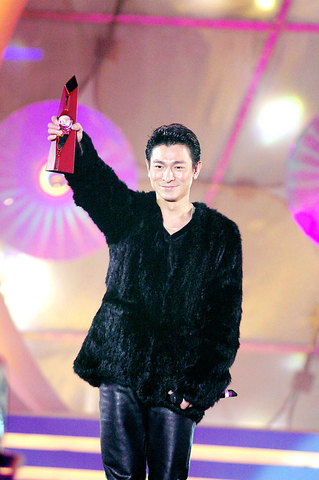With more than its fair share of tawdry scandals and uplifting newcomer achievements, 2004 was a banner year in the Chinese pop world. So, as the year draws to a close, Pop Stop pauses this week to reminisce about the moments and trends that caught our attention in Taiwan, Hong Kong and China and that made this year so much fun.
1) In one of those odd, unexplainable pop phenomena, some time in the early summer, seemingly out of the blue, everyone in Taiwan began talking about supermodel Lin Chi-ling

PHOTO: TAIPEI TIMES
2) With his antics, it was clear that TV show host Jacky Wu (

PHOTO: TAIPEI TIMES
3) Chinese director Zhang Yi-mou (張藝謀) this year released his two epic martial-arts movies Hero (英雄) and House of Flying Daggers (十面埋伏) in Europe and North America to almost universally rave reviews. The films were both panned in China for being gimmicky and untrue to the martial-arts tradition, but in the US, Flying Daggers picked up a nomination for the Best Foreign-Language Film Oscar. Hero, meanwhile, shattered US box-office records for a Chinese film, bringing in almost US$55 million.
4) Another TV variety show host who made his way into the news this year with an eyebrow-raising sensational story was Peng Chia-chia (
5) Still riding the crest of the Infernal Affairs wave that started last year, Andy Lau (劉德華) was finally given a Best Actor Golden Horse Award for his role in the series third installment in November. Up against Hong Kong buddy Tony Leung (梁朝偉) for the award, Lau beat the odds and rest of the competition for his first ever Golden Horse trophy.
6) The honors for strangest scandal this year go hands-down to actress Candy Lee (
7) Though he may not be Chinese, Sir Elton John certainly earned his place in this year's Top Ten for his dramatic arrival at CKS International Airport in September. After stepping out of an elevator to begin immigration procedures, John was hounded by Taiwan's notorious media mob and promptly began telling them to "fuck off, pigs!"
When reporters returned the favor by telling him to leave Taiwan, John said he would gladly have done so. A forgiving crowd still packed a stadium that night to hear him apologize and put on a great show.
8) Jay Chou (周杰倫) proved this year that he's still the man to beat, or at least emulate, in Mando-pop by taking the Best Album Golden Melody Award and a handful of others for his album Common Jasmine Orange (七里香), which he is still promoting on a world tour that's taken him all around Asia and even the US.
9) Having the roughest time in Mando-pop this year, local diva A-mei (張惠妹) took flak on all sides from political pundits at home and rabid nationalists in China and then released an album that fell like a wet rag straight off the charts. Still people's hometown girl, though, even if they aren't buying her records, she'll be the star of this evening's New Year's parties.
10) Hong Kong filmic auteur Wong Kar Wai (王家衛) finally finished 2046 after five years of filming just in time to enter competition at the Cannes Film Festival in May. But despite the standing ovation at the festival screening and rumors about town he had the top prize in the bag, in the end he was robbed of the Palme d'Or by Michael Moore's diatribe Fahrenheit 9/11. A second dis came earlier this month at the Golden Horse Awards, when Wong was overlooked in the Best Film and Best Director categories.

One of the biggest sore spots in Taiwan’s historical friendship with the US came in 1979 when US president Jimmy Carter broke off formal diplomatic relations with Taiwan’s Republic of China (ROC) government so that the US could establish relations with the People’s Republic of China (PRC). Taiwan’s derecognition came purely at China’s insistence, and the US took the deal. Retired American diplomat John Tkacik, who for almost decade surrounding that schism, from 1974 to 1982, worked in embassies in Taipei and Beijing and at the Taiwan Desk in Washington DC, recently argued in the Taipei Times that “President Carter’s derecognition

This year will go down in the history books. Taiwan faces enormous turmoil and uncertainty in the coming months. Which political parties are in a good position to handle big changes? All of the main parties are beset with challenges. Taking stock, this column examined the Taiwan People’s Party (TPP) (“Huang Kuo-chang’s choking the life out of the TPP,” May 28, page 12), the Democratic Progressive Party (DPP) (“Challenges amid choppy waters for the DPP,” June 14, page 12) and the Chinese Nationalist Party (KMT) (“KMT struggles to seize opportunities as ‘interesting times’ loom,” June 20, page 11). Times like these can

JUNE 30 to JULY 6 After being routed by the Japanese in the bloody battle of Baguashan (八卦山), Hsu Hsiang (徐驤) and a handful of surviving Hakka fighters sped toward Tainan. There, he would meet with Liu Yung-fu (劉永福), leader of the Black Flag Army who had assumed control of the resisting Republic of Formosa after its president and vice-president fled to China. Hsu, who had been fighting non-stop for over two months from Taoyuan to Changhua, was reportedly injured and exhausted. As the story goes, Liu advised that Hsu take shelter in China to recover and regroup, but Hsu steadfastly

You can tell a lot about a generation from the contents of their cool box: nowadays the barbecue ice bucket is likely to be filled with hard seltzers, non-alcoholic beers and fluorescent BuzzBallz — a particular favorite among Gen Z. Two decades ago, it was WKD, Bacardi Breezers and the odd Smirnoff Ice bobbing in a puddle of melted ice. And while nostalgia may have brought back some alcopops, the new wave of ready-to-drink (RTD) options look and taste noticeably different. It is not just the drinks that have changed, but drinking habits too, driven in part by more health-conscious consumers and